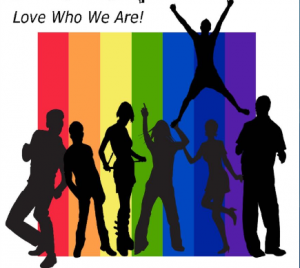By Moussa
Dailyvoiceofreason.com
13 Jan 2012
This is an article by Moussa, a Lebanese young man of 19 who speaks from his own experience of coming out and how life gets much better once we own our sexuality and accept one another.
The world we live in can seem like an absolutely terrible place. Worse yet, a part of it, which includes everything you do and everyone you know, seems to be even worse. Despite this, and despite the fact that I don’t know your name, haven’t seen your face, and don’t know more about you, I can say with confidence that it gets better.
I noticed that I was gay as a young child around the age of 7. Being brought up in Lebanon, I was in a society that wasn’t accepting and quite frankly, I didn’t know exactly what I was. Years went by and when I hit puberty, my attraction for guys became more apparent.
During those years, and even when I came to the U.S., I spent many hours crying myself to sleep. I dedicated prayer after prayer hoping God would fix me and make it all go away (I was raised Muslim). I also bullied kids that were openly gay, and when I couldn’t stand being around them, I’d avoid being next to them; in the end they were what I was trying to hide from.
After years went by, I learned more and more about gayness. I learned that it was natural and not a choice. I learned that no one would intentionally choose a life of hardship. I learned that I was this way, and in a bit of humor I remember literally saying “Shit, I’m gay” to myself before it really sunk in.
After that, I kept it held inside. I knew I was gay hidden behind a straight face assuming it would be a phase; it wasn’t. My Arab family, though not extremely religious, didn’t show signs of acceptance either. My dad would rant on about how gay people have mental problems and my mom would denounce it as a sin.
My siblings didn’t use words or make statements that were supportive of anyone coming out anytime soon.The environment wasn’t ideal to come out, let alone be supportive.
If you are Arab, you probably already understand this: how religious your family is, teachings of non-acceptance, etc. Although applicable to all gays, I’m writing this specifically to Arabs because there is still little support for us especially in the Arab world, but even in Western countries.
I feel your pain. I know your tears. I understand your prayers. Nothing you do will change who you are and and so take heed: Before expecting others to accept you, you have to accept yourself for what you are worth.
Of course, since most Arabs are Muslim, the issue of religious condemnation can never really be avoided. I decided that I couldn’t continue my faith to a religion that doesn’t have faith in me, however, for you this may be something you can’t do (it took years of research to come to my conclusion). Just take heed that there are Muslims who argue that Islam is friendly to gays. You will find their names at the bottom of this post.
For me, it got better when I sifted through the confusion of my sexual orientation as a young child and finally concluded I was gay. It got better when I stopped crying because I couldn’t change who I was. It got better when I jammed out to “Born this Way” and “Hair” by Lady Gaga which instilled the confidence I have today.
It got much better when I came out to my siblings and now they accept me. Don’t get me wrong, it wasn’t easy, some of them cried and some raged with anger; some had many questions they asked me over weeks’ time while others didn’t have any. In the end, as I write this at the young age of 19, I speak openly about it to them and we’ve moved passed it as most told me they love and support me.
Of course, my journey isn’t over and yours could have just started, but you have to realize that you never come out once. You are constantly coming out to all people and it gets better with every new time. As I came out to my first sibling, I was on the verge of tears before I could tell her. The next time became easier, fewer teary eyes, and the next had none at all, the last even had a smile.
My friends accepted me without much problems at all (I go to a pretty conservative school!). Don’t fear letting people know who you are, but do it in a smart way and think out how you are going to tell them. You can Google good ways to come out; there is a lot of material and that’s what I did. (Better yet is to approach a counselor; or friend who is gay and they will help you with your struggle.)
I will be telling people I’m gay for my entire life and I expect so will you; you just have to take the first leap and most of the fear goes away. Even at my young age, I’m so glad that I’m still around typing this up for you to read. We all have a long way to go in life and I have such big goals that the world would surely be worse off without you and I.
It does get better, but only if you want it to. I reached the point where I couldn’t quite handle that I couldn’t change who I was, even after I tried getting more into girls. Although I never actively took steps, suicide was considered, even at the young age of 13 and I thought of it many times. Finally, I decided that I wanted it to get better. I decided that without me, the world was losing it’s yet to be- treasured gem.
I’m alive and well and this gem is still being shined. How about you? Polish yourself and it gets better; you’ll get better. 🙂
Moussa, An Arab Gay
(An activist student blogger who loves to read, eat fig-newtons, hates hookah, loves my family, including my stubborn parents and loud siblings, and so much more that wouldn’t be apparent if I wasn’t around to realize them.
Reasoning:
In the world of a closeted gay, there are very few times when one can listen to a video to understand that it does get better. This is because of many reasons, most notably that at such a young age, the child may not have access to their own laptops and Internet accessing phones.
It becomes risky trying to use a home laptop or their parents’ devices to look up such things without fear of being caught; most of the time they fail to properly cover up their tracks and so avoid looking up support online at all.
Even with their own devices, parents can usually monitor their use (for good reason) and usually take away phones and laptops as punishment for bad behavior. Although with obvious purpose, this does restrict the child’s access to helpful supporting information online.
With this in mind, I’ve decided to write this out instead of making a video to help those kids maintain their secrecy since text is easier to hide than a video.
Thanks to Imam Dayiee Adullah, Dr. Scoot Kugle, Dr. Vincent Cornell, Dr. Amina Wadud, Dr. Abdullahi An-Na’im, Dr. Azeem Ibrahim, Dr. Roja Fazaeli, Dr. Hussein Rashid.
Look up organizations like Gay Middle East, Helem, Al-Fatiha or Scott Kugle’s book: Homosexuality in Islam. The network of support is small but quickly growing! Don’t worry we are here for you!
















